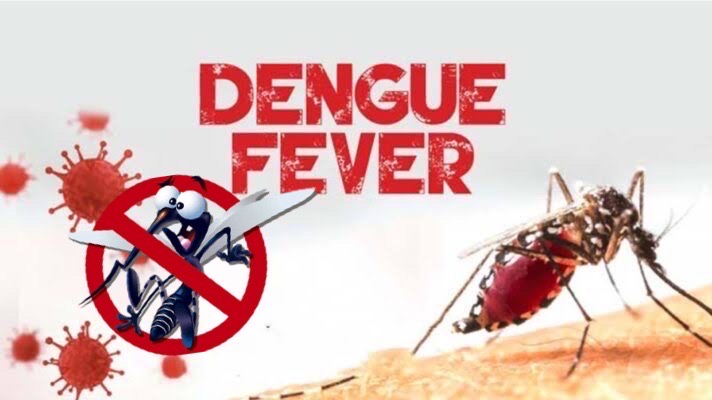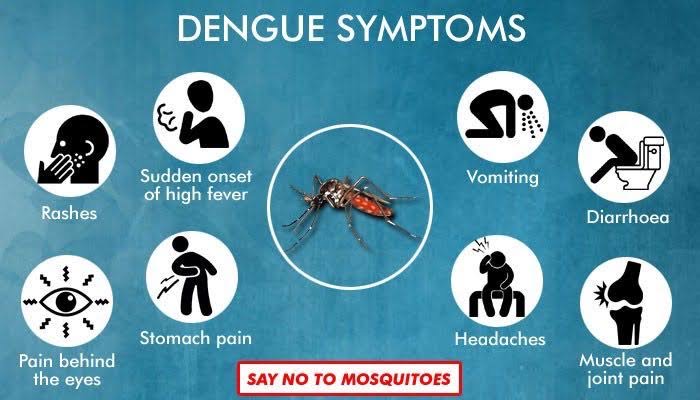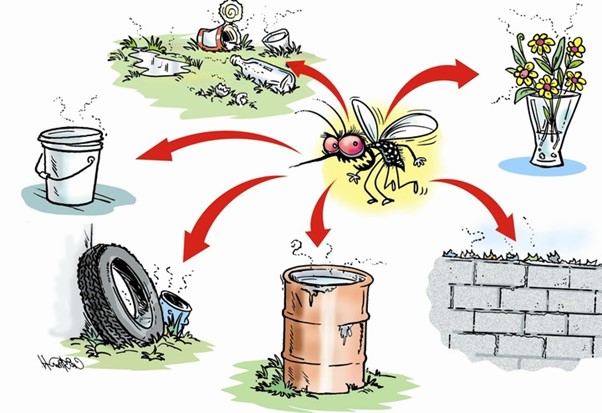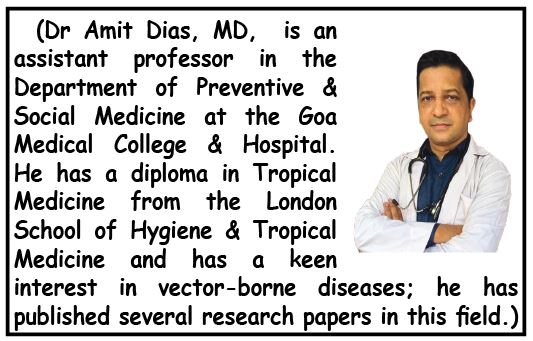Goa is abuzz with excitement as vintage bike and car owners, users, collectors and fans are decking […]

FIGHT MOSQUITOES TO FIGHT DENGUE!
July 20- July 26 2024, MIND & BODY, HEART & SOUL July 19, 2024Dengue Awareness Day is observed on May 16. Given the rise in the number of dengue cases the Goan Observer caught up Dr Amit Dias who says, “Our fight against mosquitoes is equivalent to our fight against dengue.” According to him everyone has a role to play in the prevention of the breeding of mosquitoes which cause dengue fever. Here are his guidelines which simplify an understanding of dengue so that we may stay safe …
An interview with Dr Amit Dias
Goan Observer: Doctor, we are concerned about the rising cases of dengue all around us, to start with could you explain what causes dengue?
Dr Amit Dias: Yes, it’s the right topic to discuss come the monsoon rains. Vector-borne diseases are rising all around us and that’s the nature of dengue outbreaks….they tend to be explosive. Dengue fever is caused by the dengue virus, which belongs to the Flavivirus genus. There are four distinct serotypes of the dengue virus: DEN-1, DEN-2, DEN-3, and DEN-4.
The good news is that infection with one serotype provides lifelong immunity to that specific serotype but only short-term protection against the others. This means a person can potentially be infected with other types of dengue viruses later.
Recently, together with my students, I published a paper on dengue awareness in the “International Journal of Community Medicine & Public Health” which showed that though the knowledge was good, the practices were poor. Knowledge among the students who participated in the study was better than that of the non-students. This means that awareness is increasing in schools, but we need to take the campaign beyond schools and colleges.
Q: Is it true that a second infection with dengue can be more dangerous?
A: Yes, that’s correct. A second infection with a different serotype of the dengue virus can be more dangerous. This is because of a phenomenon called antibody-dependent enhancement. When a person is infected with a different serotype, the pre-existing antibodies from the first infection can bind to the new virus, but are not able to neutralize it effectively. Instead, these antibodies facilitate the virus’s entry into host cells, leading to increased viral replication and a heightened immune response. This can result in severe forms of the disease, such as dengue hemorrhagic fever or dengue shock syndrome. These complications can be life-threatening.
Q: How does one get the dengue virus? We are aware that mosquitoes have a role to play. Could you describe the vector responsible for transmitting the virus?
A: The primary vector of the dengue virus is the Aedes aegypti mosquito. It is different from the one that transmits malaria and has distinct characteristics. This mosquito is easily identifiable by the white markings on its legs and the markings on its thorax. Aedes albopictus or the Asian tiger mosquito, can also transmit the virus.
Q: Where do these mosquitoes breed?
A: Aedes mosquitoes breed in clean stagnant water. Common breeding sites include discarded tires, coconut shells, tires, flower pots, water storage containers and any other items that can collect and hold water. Some years back there was an outbreak in people working in the barges and it left everyone wondering why this could happen. On investigating it was noticed that the barges had a lot of tyres around the boat which are used as bumpers and these were the breeding sites for the Aedes mosquitoes. These mosquitoes are most active during the day, especially during early morning and late afternoon.

Q: What are the signs and symptoms of dengue fever?
A: Dengue fever typically presents with a sudden high fever, temperature can rise to 102 or 103 and may not easily come down with the paracetamol tablet. There could be severe headaches, pain behind the eyes, joint and muscle pain, rash, and mild bleeding such as nose or gum bleeds.
Severe dengue, also known as dengue hemorrhagic fever, can cause severe abdominal pain, persistent vomiting, rapid breathing, bleeding gums, bleeding from other sites, severe fatigue and restlessness.
Q: Can you guide our readers to remember what to do about dengue?
A: Remember the word DENGUE itself:
D: Diagnosis — consider any fever as dengue and get tested at the nearest health center and do the NS1 antigen test.
E: Environment cleanliness — ensure the elimination of breeding sites, doors and windows have screens.
N: Never use any painkillers, and use aspirin drugs with caution as they can also enhance bleeding. Notify the nearest PHC regarding your diagnosis.
G: Get in touch with your doctor and ensure close monitoring of platelet count and rest.
U: Use ORS to keep yourself hydrated — speak to your physician about it.
E: Encourage community efforts to control mosquitoes and cooperate with health services.
Q: What measures has the government of India taken to control dengue?
A: The government of India has implemented several measures to control dengue and started the National Vector Borne Disease Control Program. Several activities are undertaken for dengue under this program.
Public awareness campaigns to educate people about prevention and control.
Surveillance programs to monitor and manage outbreaks.
Source reduction initiatives to eliminate mosquito breeding sites.
Fogging and spraying insecticides to reduce adult mosquito populations.
Encouraging community participation in cleanup drives.
Collaborating with local health departments for effective implementation of control strategies.

Q: In the event of a dengue outbreak what precautions should people take?
A: During a dengue outbreak people should take the following precautions:
Use mosquito repellents on exposed skin. Remember the vector is a day biter and this becomes relevant. Wear long-sleeved shirts and long pants.
Use mosquito nets while sleeping.
Ensure window and door screens are intact, very often the screens are old and have several tears which defeats the purpose.
Eliminate mosquito breeding sites by emptying or covering containers that can hold water. Make it a point to empty the breeding sites in your garden once a week which is the duration of the breeding cycle.
Support community efforts to control mosquitoes and cooperate with the health services.
Q: Can we prevent dengue with vaccines? Is there a vaccine available?
A: Yes, there is a vaccine called Dengvaxia, developed by Sanofi Pasteur, which is approved in some countries for individuals aged 9 to 16 years who have had at least one prior dengue-infection and currently live in a dengue-prone area. However, it is not widely used due to concerns about its safety in people who have not been previously infected with the dengue virus. So as of now, using integrated vector control is the best measure for prevention.
Q: What is the treatment for dengue?
A: You need to see a doctor and take treatment. Any mistake could be a major risk. There is no scope for over-the-counter management. There is no specific antiviral treatment for dengue. The management of dengue primarily focuses on adequate hydration and supportive care to alleviate symptoms and prevent complications. Monitoring for signs of severe dengue, such as persistent vomiting, severe abdominal pain, rapid breathing, bleeding and fatigue. Hospitalization may be required for severe cases for close monitoring. There may be more problems in people with comorbidities. Platelet transfusion may begin if there is a severe fall in the platelet count.
A lot of people recommend papaya leaf extract. I would not stop people from using it, but there is no robust evidence to support its role in dengue and improving platelet count. The platelets drop in the first few days and then start to rise. Taking the tablet during this period gives people the feeling that it has risen due to the tablet, but it would have happened in any case. We have people on papaya leaf extract and people who are not and both of them do well with proper hydration and close monitoring.
Q: How significant is the problem of dengue globally, in India, and specifically in Goa?
A: Dengue is a major global public health problem, with an estimated 390 million infections occurring annually. In India, dengue cases have been rising, with thousands of cases reported each year. As of April 30, 2024 over 7.6 million dengue cases have been reported to the WHO in 2024, including 3.4 million confirmed cases and 3,000 deaths. Goa, in particular, is prone to dengue outbreaks due to its tropical climate, high humidity and unplanned urbanization which creates ideal breeding conditions for Aedes mosquitoes.
Q: Why is Goa particularly susceptible to dengue outbreaks?
A: Goa’s susceptibility to dengue outbreaks can be attributed to several factors:
The tropical climate provides a conducive environment for aedes mosquito breeding.
High humidity and frequent rainfall create numerous breeding sites.
Rapid urbanization and construction activities can lead to water accumulation in various places. Lots of immigration of people from states with high dengue incidence.
The state’s popularity as a tourist destination increases the risk of dengue virus importation and spread not only within but ever across borders.
Q: What message would you like to convey to our readers regarding dengue prevention?
A: My message to your readers is to be vigilant and proactive in preventing dengue. Remember the acronym DENGUE and the steps to be followed. Simple actions like keeping your surroundings clean, eliminating stagnant water and using mosquito protection can go a long way in reducing the risk of dengue. Get every case of fever tested for dengue and malaria. Community participation is crucial and everyone must work together to combat this disease. Stay informed, stay protected, and support the efforts of the Directorate of Health Services to control the spread of dengue.
















